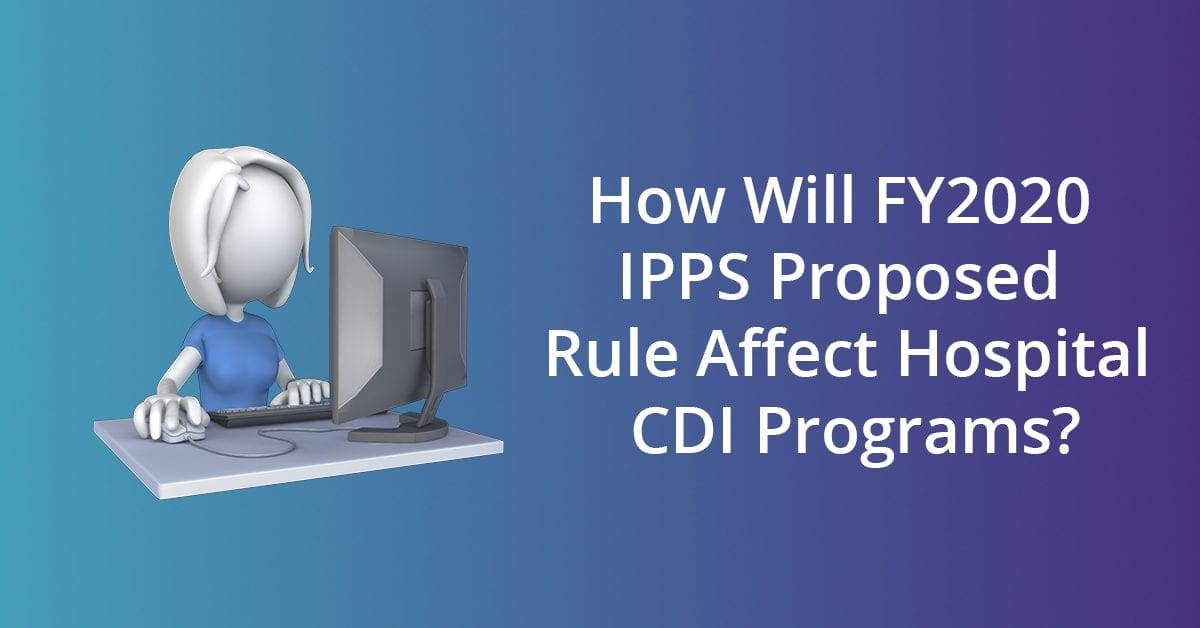Call us toll-free: 800-878-7828 — Monday - Friday — 8AM - 5PM EST


By Shannon Wiggins for HIT Consultant
In April, Centers for Medicare and Medicaid Services (CMS) released the fiscal year (FY) 2020 inpatient prospective payment systems (IPPS) proposed rule. The proposed rule notably includes approximately 1,500 complications or comorbidities (CC)/major complications or comorbidities (MCC) designation changes and 324 changes to International Classification of Diseases (ICD)-10-CM codes, along with several other updates. The designation changes are an effort to respond to the notion that the CC/MCC assignment are no longer appropriate as conditions and factors have shifted.
From a clinical documentation improvement (CDI) perspective, hospitals that focus on CC/MCC designation alone could see effects in their quality ratings if these conditions are not fully evaluated. Some examples of the changes to CC/MCC designations are listed below. Several of the changes fall into chronic conditions that are considered significant by CMS and are areas that quality, as well as clinical documentation integrity programs, often focus their work. These areas include:
Obesity
– Codes for BMI (body mass index) <19.9 and between 40-49.9; Downgrade from CCs to non-CCs
Malnutrition
– Code E42, Marasmic kwashiorkor; Downgrade from an MCC to a CC
– Code E43, Unspecified severe protein-calorie malnutrition; Downgrade from an MCC to a CC
Heart Failure
– Certain codes in the I21 category related to STEMI and subsequent NSTEMI (ST-elevated myocardial infarctions and non); Downgrade from MCCs to CCs (Note: certain acute NSTEMI and MIs would remain MCCs)
– Codes for systolic, diastolic and combined chronic heart failure; Downgrade from CCs to non-CCs
Chronic Kidney Disease
– Codes for stage 4 and 5 chronic kidney disease; Downgrade from CCs to non-CCs
– Code for end-stage renal disease; Downgrade from an MCC to a CC
Cancer
– Codes when assigned as a secondary diagnosis; Downgrade from CCs to non-CCs
– Most cancers invisible to the eye and malignancies invisible to external inspection; Downgrade from CCs to non-CCs
Impacts on Hospital Reimbursements
The proposed changes will greatly impact the reimbursement of hospitals and other facilities across the board. The resources required for treatment of these conditions, many of which are no longer considered MCC/CCs, will be a financial burden due to the proposed IPPS rule. More specifically, the changes infer that patients with these disease burdens and conditions do not require as many resources than patients without the condition. In areas such as obesity/malnutrition, heart failure and chronic kidney disease, it is difficult to agree that these would not require additional resources such as labs, pain management, I&Os (intake and output), additional imaging, daily weights and, oftentimes, a higher level of nursing care in general.
Regarding the downgrade of the secondary diagnoses of cancer, the rationale given to downgrade was stated that because it is not the condition that caused the patients admission to the hospital it does not significantly impact resource use. As in the conditions discussed above, it is difficult to agree that a secondary diagnosis of cancer may not require pain control, lab monitoring, follow-up imaging or consideration for further complications. Also, if a patient is undergoing active chemotherapy for a secondary diagnosis of cancer, there is always potential for further evaluation, monitoring or treatment.
Conversely, there are proposed changes to CC/MCC designations that are positive and will more accurately reflect the overall patient condition. Some of these include:
Pressure Ulcers
– Stage I, II pressure ulcers, including unspecified and unstageable; Upgrade from Non-CCs to CCs; Stage III and IV, downgrading from MCC to CC, thus all pressure ulcers now a CC
Asthma
– Severe persistent asthma with acute exacerbation; Upgrade from CC to an MCC
Diabetes
– Codes for drug-induced or chemical diabetes; Upgrade to CCs
CMS has sought public comment on the proposed rule. To view all submitted thoughts and comments, visit https://www.regulations.gov/document?D=CMS-2019-0073-0003 and follow the instructions under the “Comment Now” button.
